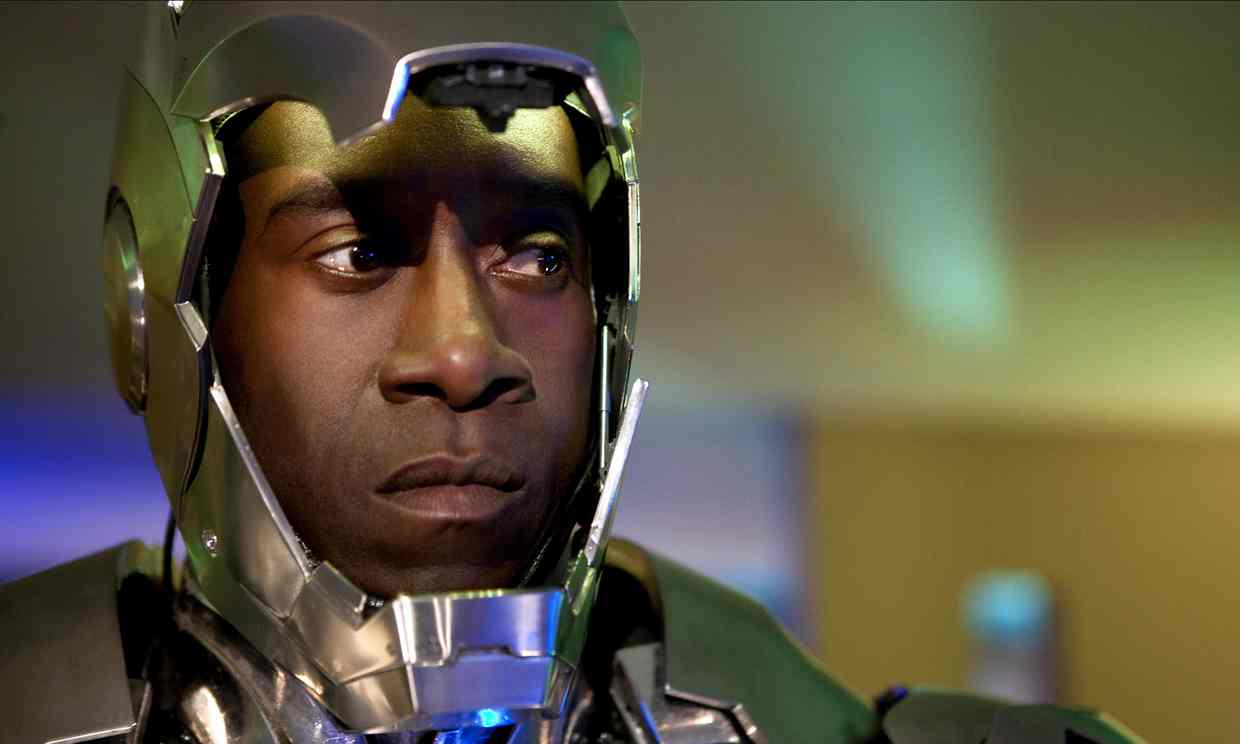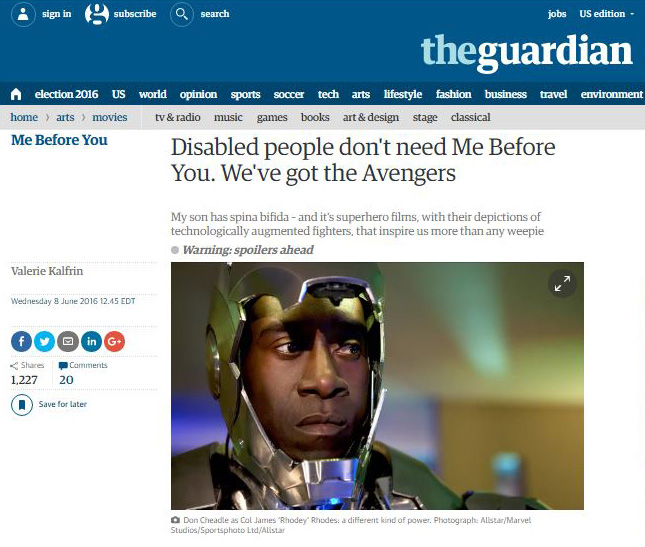
Don Cheadle as Col. James ‘Rhodey’ Rhodes. Allstar/Marvel Studios/Sportsphoto Ltd/Allstar
My son has spina bifida – and it’s superhero films, with their depictions of technologically augmented fighters, that inspire us more than any weepie
Warning: spoilers ahead
By Valerie Kalfrin
The Guardian, June 8, 2016
With the drama Me Before You rankling disabled people and their loved ones on both sides of the pond (and the director still stoking the fire), it’s time to applaud another current film for two low-key but giant leaps for disabled characters onscreen: Captain America: Civil War.
These moments haven’t been widely publicized, no doubt to avoid spoilers – so consider yourself warned. A superhero film might seem to have little in common with a tearjerker. Yet storytellers of any genre can take a page from Marvel Studios for the class and respect its film shows in portraying people with varying abilities.
Superheroes are huge in my household. My six-year-old son adores them. Ever since he was old enough to understand he has spina bifida – a birth defect of the spinal cord that commonly causes some form of paralysis – we’ve used heroes as analogies. He has Batman’s brains, Thor’s silky blond hair, Cap’s heart, Spidey’s energy, Rocket’s swagger, Iron Man’s creativity – and his armor, too.
My son can’t feel his feet, so he walks with forearm crutches and leg braces that we call “bot legs”, for “robot legs”. His were molded with his choice of pattern, white skulls and crossbones on a black background. He also uses a bright-green wheelchair and zips around like Quicksilver or the Flash.
To alleviate extra cerebrospinal fluid in his head, he has a shunt under the skin behind his right ear. We liken it to Iron Man’s arc reactor – something needed to help keep his brain safe just like Tony Stark’s light in his chest protects his heart.
In Civil War, Tony’s friend James “Rhodey” Rhodes (Don Cheadle), AKA War Machine, suffers a spinal injury during the heroes’ face-off on an airport tarmac. (The screenwriters probably repurposed Tony’s paralysis as described in the comics in the 1980s, after an attempt on his life.) At the film’s end, Rhodey learns to walk again with his own hi-tech set of “bot legs”. He falls, but he waves off Tony’s helping hand – and pity. He’s been a military pilot a long time, flown more than a hundred missions. Something like this could have happened anytime.
“Still sucks, though,” he acknowledges.
Then he gets up to try again, even joking with Tony as a FedEx deliveryman mangles Tony’s last name.
Same Rhodey. Just moves differently.
This scenario could have been handled as ham-fistedly as it often is onscreen, with copious tears and anguish. But the film-makers had another tone in mind, telegraphed earlier through Wanda Maximoff (Elizabeth Olsen), AKA Scarlet Witch. Her telekinesis makes her a powerful Avenger but someone whom the world beyond her team-mates isn’t sure how to handle.
“I used to think of myself one way. But after this,” she says of her powers, obtained through an experiment, “I am something else. And still me, I think. But that’s not what everyone else sees.”
 Ultimately, she decides she can’t control other people’s thoughts and fears about her powers. “I can only control my own.”
Ultimately, she decides she can’t control other people’s thoughts and fears about her powers. “I can only control my own.”
These are refreshingly graceful notes from the same studio that used a little girl’s leg braces in Iron Man 3 as visual shorthand for why the vice-president sided with a villain: the bad guy’s virus could “fix” her. Disabled people should not be convenient mechanisms through which other characters find motivation and fulfillment, a trope seen not only in Me Before You (which the Guardian’s review called “a deathly dull euthanasia romcom”) but other films. This summer alone, we’ve seen another disabled man as a plot device – his wheelchair explodes at a key moment – in Batman v Superman: Dawn of Justice.
Me Before You, based on JoJo Moyes’s bestseller, shows a quadriplegic man (Sam Claflin) and his caregiver (Emilia Clarke) falling in love, then his opting to die. Director Thea Sharrock said the film was faithful to the novel’s ending: “It’s too easy to do it the other way. We could all tell that story tomorrow. But this way … this is the more interesting way.”
How is living easy or less interesting? Living takes courage and resilience and humor, whether you have a disability or not. We have to lift our son’s wheelchair up three steps in an aquarium because lousy signage for the accessible restroom points us that way (and often there’s someone in the one wheelchair stall in an otherwise-empty bathroom). We’ve had to explain surgeries when our son needs them and “smash worries” with his plush Hulk, even when we’re worried ourselves. Other parents have frustrations and worries, too. They don’t negate the joys.
Sharrock has said that she knew her film’s subject matter was “susceptible to very strong opinions”, but that advocates protesting at the London premiere and attacking it through Twitter hashtags like #MeBeforeEuthanasia have “a fundamental misunderstanding” of the film’s message. “It’s a fictional story about how important the right to choose is. The message of the film is to live boldly, push yourself, don’t settle.”
That message is aimed squarely at the caregiver. How brave a choice would it have been to show a love story involving a couple who lives boldly together, like Dana and Christopher Reeve – Superman onscreen in the 70s and 80s and a real-life hero worldwide after he became disabled and an advocate?
None of us can choose the hand we’re dealt in life; we just deal with it. I know there are people everywhere, disabled and not, who struggle with despair, and I’m thankful for how blessed we’ve been. Before our son was born, we heard worries from well-meaning people, wondering what we could handle. But we found our own normal. Our son does things his own way, and how he moves is such a small part of who he is that at times I think walking is overrated. We can’t control people gaping at him, but we can show him that he’s more than his feet.
Animated films and other adaptations already have given us disabled characters who illustrate how they can be different and thrive: Marvel’s Daredevil and Professor X, Oracle from DC Comics, Nemo from Finding Nemo (and soon Finding Dory), Hiccup in the How to Train Your Dragon films – and now Rhodey and Wanda, too. I can’t wait to see them suit up again, with colleagues adapting as they have.
My son is already my hero. Now he can add to his arsenal War Machine’s legs and Scarlet Witch’s spirit.
From https://www.theguardian.com/film/2016/jun/08/disabled-people-avengers-superheroes-me-before-you-film
